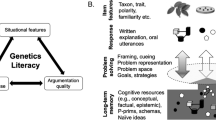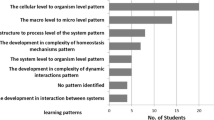
Overview
- Offers insights from classroom-based research for tracing students’ systems thinking throughout their learning process
- Introduces elements of computer-based learning environments designed for complex systems
- Advances approaches and theoretical frameworks for explicit guidance in using system language
Part of the book series: Contributions from Biology Education Research (CBER)
Access this book
Tax calculation will be finalised at checkout
Other ways to access
About this book
This book synthesizes a wealth of international research on the critical topic of ‘fostering understanding of complex systems in biology education’. Complex systems are prevalent in many scientific fields, and at all scales, from the micro scale of a single cell or molecule to complex systems at the macro scale such as ecosystems. Understanding the complexity of natural systems can be extremely challenging, though crucial for an adequate understanding of what they are and how they work.
The term “systems thinking” has become synonymous with developing a coherent understanding of complex biological processes and phenomena. For researchers and educators alike, understanding how students’ systems thinking develops is an essential prerequisite to develop and maintain pedagogical scaffolding that facilitates students’ ability to fully understand the system’s complexity. To that end, this book provides researchers and teachers with key insights from the current research community onhow to support learners systems thinking in secondary and higher education. Each chapter in the book elaborates on different theoretical and methodological frameworks pertaining to complexity in biology education and a variety of biological topics are included from genetics, photosynthesis, and the carbon cycle to ecology and climate change. Specific attention is paid to design elements of computer-based learning environments to understand complexity in biology education.
Similar content being viewed by others
Keywords
Table of contents (12 chapters)
-
Front Matter
Reviews
Editors and Affiliations
About the editors
Prof. Orit Ben-Zvi Assaraf is former Chair of the Graduate Program for Science and Technology Education, at the Ben-Gurion University of the Negev Israel. Her work in science education focuses on issues such as: Design of informal outdoor learning environments; Cognitive based research into systems thinking in the field of Biology, Ecology and Earth sciences and development of environmental literacy and nature conservation within science education.
Bibliographic Information
Book Title: Fostering Understanding of Complex Systems in Biology Education
Book Subtitle: Pedagogies, Guidelines and Insights from Classroom-based Research
Editors: Orit Ben Zvi Assaraf, Marie-Christine P. J. Knippels
Series Title: Contributions from Biology Education Research
DOI: https://doi.org/10.1007/978-3-030-98144-0
Publisher: Springer Cham
eBook Packages: Education, Education (R0)
Copyright Information: The Editor(s) (if applicable) and The Author(s), under exclusive license to Springer Nature Switzerland AG 2022
Hardcover ISBN: 978-3-030-98143-3Published: 26 May 2022
Softcover ISBN: 978-3-030-98146-4Published: 27 May 2023
eBook ISBN: 978-3-030-98144-0Published: 25 May 2022
Series ISSN: 2662-2319
Series E-ISSN: 2662-2327
Edition Number: 1
Number of Pages: VIII, 278
Number of Illustrations: 1 b/w illustrations
Topics: Science Education, Research Methods in Education, Education, general, Science and Technology Studies



